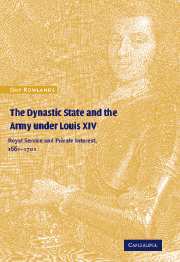Book contents
- Frontmatter
- Contents
- List of maps
- Acknowledgements
- List of abbreviations
- Family tree of the Le Tellier: 1. Principal branch
- Family tree of the Le Tellier: 2. Royal household marital connections
- Map 1 The French provinces under Louis XIV
- General introduction: ‘Absolute monarchy’, dynasticism and the standing army
- Part I ‘Patrimonial bureaucracy’: The Le Tellier dynasty and the Ministry of War
- Introduction
- 1 The Secretary of State for War and the dynastic interests of the Le Tellier family
- 2 The ebb and flow of Le Tellier power, 1661–1701
- 3 The use and abuse of servants: the Ministry of War, venality and civilian power in the army
- 4 Financing war: the treasury of the Extraordinaire des Guerres
- 5 Corruption and the pursuit of self-interest in the Ministry of War
- Part II The forging of the French officer corps and the standing army under Louis XIV
- Part III The high command of the French armies
- Conclusion: The preservation of the dynasty
- Appendix 1 Defining the grands
- Appendix 2 The proportion of revenue generated by the Extraordinaire des Guerres as a ‘primary receiver’
- Bibliography
- Index
- CAMBRIDGE STUDIES IN EARLY MODERN HISTORY
Introduction
Published online by Cambridge University Press: 20 May 2010
- Frontmatter
- Contents
- List of maps
- Acknowledgements
- List of abbreviations
- Family tree of the Le Tellier: 1. Principal branch
- Family tree of the Le Tellier: 2. Royal household marital connections
- Map 1 The French provinces under Louis XIV
- General introduction: ‘Absolute monarchy’, dynasticism and the standing army
- Part I ‘Patrimonial bureaucracy’: The Le Tellier dynasty and the Ministry of War
- Introduction
- 1 The Secretary of State for War and the dynastic interests of the Le Tellier family
- 2 The ebb and flow of Le Tellier power, 1661–1701
- 3 The use and abuse of servants: the Ministry of War, venality and civilian power in the army
- 4 Financing war: the treasury of the Extraordinaire des Guerres
- 5 Corruption and the pursuit of self-interest in the Ministry of War
- Part II The forging of the French officer corps and the standing army under Louis XIV
- Part III The high command of the French armies
- Conclusion: The preservation of the dynasty
- Appendix 1 Defining the grands
- Appendix 2 The proportion of revenue generated by the Extraordinaire des Guerres as a ‘primary receiver’
- Bibliography
- Index
- CAMBRIDGE STUDIES IN EARLY MODERN HISTORY
Summary
The origins of ministerial government in the western world lay in the transformation of royal private secretaries from the personal aides of a prince into major political players in their own right running fully fledged, if small, departments of state. In the course of the sixteenth century secretaries of state emerged at the courts of both France and Spain, but by the 1600s these two great powers had diverged in their models of government. In Spain during the later years of Philip II's reign secretarial authority stalled and multiple layers of conciliar government came to prevail, while in England the Privy Council retained a collective importance over and above the relationship between the secretaries and the monarch. In France, however, the secretaries of state, alongside the financial officials, emerged under Henri III and Henri IV as the vital agents of royal executive power, recruited principally from among lawyers and junior councillors. Not least they provided the king with some insulation from the competing influences of the grands, who found themselves increasingly excluded from institutional roles at the heart of government to the benefit of the secretaries. This system, with modifications, was imitated in Savoy from the 1660s and in Spain after 1700.
Initially the responsibilities of French secretaries of state were allocated on a geographical basis, with each one of these four or five officials entrusted with nearly all business related to a particular region of the kingdom.
- Type
- Chapter
- Information
- The Dynastic State and the Army under Louis XIVRoyal Service and Private Interest 1661–1701, pp. 27 - 31Publisher: Cambridge University PressPrint publication year: 2002

